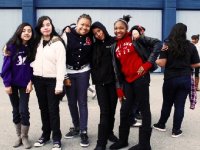Beyond Twitter and Google+: Staying Focused on Real Connection
Instead of focusing solely on social media, connected educators should stay tuned into their classrooms, meet other educators face to face, and model real-world engagement.
Your content has been saved!
Go to My Saved Content.One of my favorite movie trilogies of all time is Back to the Future. (Sorry, Edutopia, Star Wars is a close second.) However, rather than elaborating on why one is better than the other, I'm going to single out one scene. It happens in the Back to the Future sequel and shows a confused Marty McFly walking around an alternate Hill Valley in which Biff Tannen rules everything, and nothing is quite the way it should be. This scene reminds me a lot of how I currently feel about Twitter and education.
The Good Ol' Days
I have been using Twitter since 2007, thanks to the suggestion of Springfield Township High School librarian, Joyce Valenza. This medium has connected me to so many great educators and people whom I now consider great friends. It has helped me through down times in my career and allowed me to share the proud moments. I've participated in many "chats" driven by hashtags and even crowdsourced comments about my grandmother's hand-painted Easter egg a few years ago. She couldn't believe that anyone would care or comment on such a thing, but was genuinely awestruck by all the attention.
I've used Twitter for professional development, to further my learning, answer questions, land a job, and share at conferences. In essence, the Twitter I remember from my early days of using the medium slightly resembles that pristine image of Hill Valley where the song "Mr. Sandman" is always playing. But I now feel like Twitter has become Biff's alternate universe that is not as familiar as it used to be. And I'm not trying to play the role of "old man Marcinek" who is afraid of change and constantly reminisces about the "good ol' days." Rather, I'm hoping to bring to light an observation.
Twitter has come of age, and it's falling flat. While I continue to use this medium, I don't attend to it as much as I used to. I will use it at a conference and share when I find something interesting or write a post such as this one, but I don't feel that it defines me as an educator. With Connected Educator Month upon us, I wanted to share this assertion as well as what I feel a connected educator should and can be. I'm not here to condemn Twitter and highlight its faults, but rather to share something that I’ve noticed recently.
3 Other Ways of Thinking About Connection
A connected educator should first and foremost be connected to his or her classroom and the students that visit it daily. While this idea seems obvious, it's sometimes overshadowed by the stigma around what a connected educator should be. The more I connect with new teachers, the more I encourage them to first find a digital space where they can bridge the classroom to the greater community. This is where you develop a healthy, consistent web presence, and provide a transparent experience for parents and students seeking to learn more about your class.
Next, connect with other educators in person. I would suggest finding an edcamp in your neighborhood. There's a great chance that one is happening. In my experience, edcamps have been one of my most valuable career resources. I've organized three edcamps and will have a chance to organize another next Spring at Edcamp Grafton on March 21. Edcamps are important for new and connected educators because they are driven by conversation. At its core, an edcamp is where I would start making my connections as a new teacher or a teacher looking to connect beyond the classroom.
And finally, focus your connected life. Being a connected educator doesn't mean sharing the most articles via Twitter, acquiring the most followers, or even winning a Bammy! Award. Allow yourself a healthy balance of screen time with analog time. Put the devices down and not only do yourself a favor, but also model a good example for our students. Don't feel the need to sign up for every new app or service, but instead find a few that work for you, and use them effectively in order to make your connected educational life more efficient and resourceful. Sometimes the best connected educators are the ones who can disconnect frequently.
The Real Focus
Two of the best educators that I have known in my life do not have a Twitter account, nor are they on Google+. In fact, you've probably never heard of them. My 11th grade English teacher, Ms. Stellfox, and my former boss and retired superintendent, Anthony Bent, are probably the two most connected educators I know. Right now, Anthony Bent is in Finland connecting with other educators to get a more global perspective on education and find ways in which the American education system can do better. Ms. Stellfox connected all of the students that walked into her classroom with the world of Shakespeare by sharing stories of her travels abroad and connecting us with a world that many of us did not know about. And, after her untimely death, Ms. Stellfox continued to connect students at Dickinson College through a generous donation that brought famed novelists to the school as speakers.
A connected educator is so much more than social media. A connected educator is invested and focused on his or her students. These educators find time to share digitally and converse in face-to-face forums. I imagine that Twitter will live on and that educators will continue to flock toward it. But remember to keep focused on student learning and growth. And despite all the Twitter followers in the world, making a connection with one student is better than any award out there.
